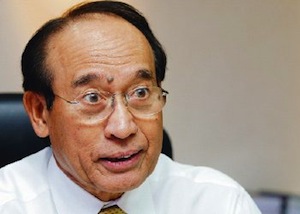Only the 222 MPs can oust PM Najib from office

Former AG Talib says public rallies cannot remove him, but adds that no one will be breaking the law by participating in peaceful rallies.
(FMT) – Bersih 5 participants cannot remove Prime Minister Najib Razak from office. This can only be done by 222 members of Parliament, former attorney-general (AG) Abu Talib Othman said.
“Najib can only be removed by either a no-confidence vote when Parliament is sitting or by making a representation to the Yang di-Pertuan Agong when the Dewan Rakyat is not in session,” he said.
Alternatively, the prime minister has to step down from office on his own volition, he added.
“These are the three legally permissible means to remove Najib,” Abu Talib, the AG between 1980 and 1993, told FMT.
With the exception of second prime minister Razak Hussein (1970-1976) who died in office, all others vacated their positions in a peaceful transition.
He said the real power to remove Najib rested with the 222 MPs – 132 from the ruling Barisan Nasional (BN) and 90 opposition and independent members.
Abu Talib said this in response to Bersih’s rally on Nov 19 to demand for institutional reforms and to seek the ouster of Najib from office.
This was also the thrust of a Citizens’ Declaration campaign started by former prime minister Dr Mahathir Mohamad and 40 others in March, urging Malaysians to join them in removing Najib through peaceful means.
Some 1.3 million people allegedly signed the Citizens’ Declaration calling for Najib’s removal within two months of the launch, but it appears to have been abandoned as Dr Mahathir was prevented from handing over a petition to the king.
Abu Talib said those who participated in rallies would not be breaking any law as long as they sought non-provocative and non-violent means.
“The organisers and participants must adhere to provisions in the Peaceful Assembly Act. The question is whether the authorities will approve the gathering,” he said.
He said the public could not do much at the moment except wait for the next general election, due in 2018.
Until then, Abu Talib said, voters could meet their MPs to complain about the prime minister if they so wished.
“They can express their opinions to their elected representatives but the question is whether the MPs will listen,” he added.

